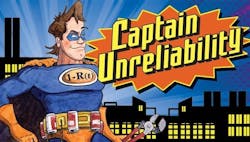Operational excellence: The heroes we don’t deserve
Key Highlights
- OpEx often prioritizes paper savings over real floor improvements, draining support from skilled teams.
- Continuous “efficiency” pushes can overload workers while cutting the tools and staffing needed to deliver value.
- KPIs become reporting theater when metrics outrank measurable operational outcomes or frontline impact.
- Trust the Captain.
Ah, Operational Excellence—what a marvel of modern corporate strategy! If you haven’t heard, these champions of efficiency have saved the world about a million times over.
Operational Excellence, or OpEx as it’s affectionately known among the elite circles, is more than just a collection of mind-bogglingly complex diagrams, process maps, and endless PowerPoint presentations. It’s a philosophy, a sacred path that brings enlightenment through eliminating waste, trimming costs, and squeezing out every last drop of inefficiency. Sure, some might argue it’s nothing more than glorified corporate austerity, but those people simply don’t understand the beauty of forcing three people to do the job of ten.
Let’s not forget the profound impact these initiatives have had on employee morale. Nothing boosts a workforce quite like hearing about the trillions of theoretical dollars saved while their own budgets, benefits, and resources shrink into oblivion. And who wouldn’t feel a warm glow of pride when their job description is “optimized” for efficiency, which, of course, means doubling the workload for half the staffing? It's the kind of subtle empowerment that reminds you that you’re a valued team member, at least until the next “right-sizing” comes along.
Operational Excellence has also introduced us to a wonderful new world of KPIs and metrics. Every single action, from the way you click your mouse to the speed of your coffee breaks, can now be measured, analyzed, and improved. And if you thought these KPIs were meant to improve operations, you’re missing the point entirely. The real purpose of KPIs is to produce stacks of reports that get passed up the chain until they land on the desk of some executive who glances at them briefly before declaring victory over inefficiency. It’s like a game of telephone, except at the end, everyone congratulates themselves for savings that somehow only exist on paper.
The hallmark of Operational Excellence, though, is the ceaseless barrage of “continuous improvement” projects. Don’t you just love the way these projects pop up, one after another, promising revolutionary change with each iteration? By the time the dust settles, no one can remember what the original problem even was, but that’s okay. As long as we’re showing “progress,” we’re winning. And let’s not forget the beauty of the “pilot program”—a perpetual testing phase that never quite gets implemented across the company, so it can always be hailed as a future success without the pesky hassle of actually producing results.
And oh, the savings! According to the reports, Operational Excellence has saved us trillions, or maybe it’s quadrillions now—it’s hard to keep track. Just imagine the stacks of imaginary cash piling up in some virtual vault somewhere. It’s truly inspiring to think of all the abstract value created while the rest of us cut corners to keep the lights on. The stock price may look suspiciously flat, and revenue might be an afterthought, but as long as those hypothetical savings keep rolling in, we’re golden.
Speaking of stock price, just look at it—steady as a rock, unwavering for the past decade! It might look like it’s doing absolutely nothing, but that's actually a sign of stability. Underneath that stagnant surface lies trillions of dollars in “savings,” all thanks to Operational Excellence initiatives. And if you're wondering why we haven't felt the impact of these "savings" in any tangible way, well, that’s only because we're too short-sighted to appreciate the genius behind it all.
Perhaps the crowning jewel of Operational Excellence is its uncanny ability to be self-sustaining. See, you’d think a department focused on “lean” and “efficiency” would eventually work itself out of a job, right? But no! Operational Excellence is as eternal as the pyramids. Every year brings a fresh round of savings to capture, processes to streamline, and people to re-educate on how to fill out a form just a little faster. They’ve managed to turn cost-cutting into an art form, a never-ending cycle of improvement that has somehow led to…well, right back where we started.
So let’s raise a glass to Operational Excellence—the unsung heroes of the balance sheet. They may not have moved the stock price, improved revenue, or made anyone’s day-to-day life any easier, but they’ve certainly filled a lot of spreadsheets. And really, isn’t that what corporate success is all about?
About the Author
Captain Unreliability
Captain Unreliability is a satire of the state of the manufacturing industry in ’Merica today and is written by an industry professional known for using humor to get the point across. Stay tuned for more useless advice, and if you have topics you’d like to see covered or questions you’d like The Captain to weigh in on, contact The Captain directly at [email protected] or follow on Twitter @CUnreliability. Also, consider becoming Unreliable today by getting your Captain t-shirt at https://reliabilityx.com/product-category/gear.
